
Journal of Applied Water Engineering and Research
Scope & Guideline
Exploring the Future of Water Resource Management
Introduction
Aims and Scopes
- Hydrological Modeling and Forecasting:
The journal emphasizes the use of hydrological models to simulate and forecast water flow, sediment transport, and flood events, employing techniques such as artificial neural networks (ANN) and ensemble forecasting. - Water Quality and Treatment Innovations:
Research on innovative water treatment methods, including advanced oxidation processes, coagulants, and filtration systems, is a core focus, addressing issues such as pollutant removal and drinking water safety. - Climate Change Impacts on Water Resources:
Papers often explore how climate change affects hydrology, river systems, and water availability, providing insights into adaptive management strategies. - Sustainable Water Management Practices:
The journal promotes sustainable practices in groundwater management, irrigation, and urban water systems, focusing on the integration of technology and policy. - Infrastructure and Hydraulic Engineering:
Research related to the design and optimization of hydraulic structures, including dams, levees, and drainage systems, is a significant aspect of the journal's contributions. - Environmental and Ecological Aspects of Water Engineering:
The journal also covers studies on the ecological impacts of water engineering projects and the role of water in environmental sustainability.
Trending and Emerging
- Climate Resilience and Adaptation Strategies:
There is a growing emphasis on research that addresses climate resilience, including the development of adaptive strategies and technologies to mitigate climate impacts on water resources. - Smart Water Management and Technology Integration:
The trend towards smart water management systems, leveraging IoT and data analytics, is emerging, with studies focusing on optimizing water distribution and consumption in urban environments. - Advanced Computational Modeling Techniques:
Recent papers highlight the use of advanced computational methods, such as coupled modeling and machine learning, to improve the accuracy of hydrological predictions and management practices. - Ecosystem-Based Water Management:
Research is increasingly focusing on ecosystem-based approaches that integrate ecological health with water management, emphasizing the importance of maintaining ecological integrity. - Renewable Energy Applications in Water Engineering:
The integration of renewable energy sources in water management practices, such as hydropower generation and desalination, is becoming a significant area of research.
Declining or Waning
- Traditional Water Resource Management Techniques:
There appears to be a waning interest in conventional water resource management methods, such as simple empirical models and basic statistical approaches, as researchers increasingly adopt more sophisticated modeling techniques. - Generalized Flood Risk Assessment:
The focus on generalized methodologies for flood risk assessment has decreased, with a shift towards more localized studies that consider specific regional characteristics and advanced modeling. - Basic Water Quality Testing Methods:
Research on basic water quality testing methods is becoming less prominent as the journal showcases more innovative and complex treatment technologies and methodologies. - Historical Hydrology Studies:
There is a noticeable decline in papers focused on historical hydrology and retrospective analyses, as the journal is increasingly oriented towards contemporary issues and predictive modeling. - Non-Integrated Water Management Approaches:
The journal has shifted away from non-integrated approaches to water management, favoring studies that explore the interconnections between surface and groundwater systems.
Similar Journals

RBRH-Revista Brasileira de Recursos Hidricos
Advancing Knowledge for Sustainable Aquatic SystemsRBRH-Revista Brasileira de Recursos Hidricos is a leading peer-reviewed journal dedicated to the dissemination of high-quality research in the field of water resources, published by the Associação Brasileira de Recursos Hídricos (ABRH). With both ISSN 1414-381X and E-ISSN 2318-0331, this journal has established itself as an essential resource since its transition to Open Access in 1996, fostering widespread accessibility to vital research findings. Based in Brazil, the journal serves a global audience, embodying a commitment to the study and management of aquatic systems, including their dynamics and technological solutions. As part of its rigorous academic contributions, it has achieved Q3 rankings across categories such as Aquatic Science, Earth-Surface Processes, Oceanography, and Water Science & Technology, reflecting its impact and relevance in these domains. Researchers, professionals, and students are encouraged to engage with the journal's diverse array of studies from 2016 to 2024, consolidating knowledge on crucial water resource challenges and innovations.
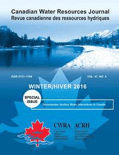
Canadian Water Resources Journal
Bridging research and practice for water sustainability.Canadian Water Resources Journal, published by Taylor & Francis Inc, is a leading academic journal dedicated to the field of water science and technology. With a significant history dating back to its inception in 1976, the journal offers a platform for high-quality, peer-reviewed research that addresses critical issues in water resources management, hydrology, water quality, and policy. The journal is recognized for its valuable contributions to the field, exemplified by its classification in the Q2 category for Water Science and Technology and holding a respectable rank of #137 out of 261 in the Scopus Environmental Science category. While it does not currently offer open access, its articles remain accessible through various institutional subscriptions, ensuring that professionals, researchers, and students stay updated with the latest advancements and discussions in water resources. As it converges towards its ongoing publication commitment through 2024, the Canadian Water Resources Journal remains an essential resource for those engaged in the pursuit of sustainable water management solutions.
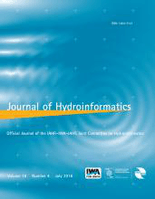
JOURNAL OF HYDROINFORMATICS
Empowering Research in Water Engineering and Sciences.JOURNAL OF HYDROINFORMATICS, published by IWA PUBLISHING in the United Kingdom, is a leading open access journal in the field of water-related sciences and engineering. Since its inception in 1999, it has evolved to become a pivotal platform for the dissemination of significant research and innovative findings, especially after adopting an open access model in 2021. The journal spans a broad scope, intersecting various disciplines such as atmospheric science, civil and structural engineering, geotechnical engineering, and water science and technology, with its 2023 rankings placing it impressively in the Q2 quartile across several categories. With an impact factor reflective of its esteemed position within the academic community and its reach underscored by its Scopus rankings, the JOURNAL OF HYDROINFORMATICS appeals to a diverse readership including researchers, professionals, and students dedicated to advancing knowledge in hydroinformatics and related fields. Whether you are seeking to publish your cutting-edge research or to stay informed on the latest developments, this journal serves as an indispensable resource.
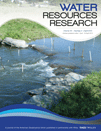
WATER RESOURCES RESEARCH
Advancing the Science of Water ManagementWATER RESOURCES RESEARCH, published by the American Geophysical Union, stands as a premier journal in the field of environmental science, specifically within the domain of water science and technology. With an impressive impact factor and a categorical ranking of Q1 for 2023, it ranks within the top 10% of relevant journals, evidencing its critical role in advancing the knowledge and application of water resources research. Since its inception in 1965, the journal has been dedicated to rigorous research that addresses pressing global challenges related to water resource management, hydrology, and environmental sustainability. The journal's comprehensive publication scope aims to present innovative findings and methodologies that can shape effective policies and practices. Although it does not offer open access, the robust research it publishes continues to influence academics and practitioners alike, ensuring its position as an essential resource for anyone engaged in the pursuit of water-related knowledge and solutions.

Water Resources
Innovating for a sustainable future in water management.Water Resources, a prominent journal published by MAIK NAUKA/INTERPERIODICA/SPRINGER, focuses on the critical and evolving field of water science and technology. Established in 1976 and with a long-standing commitment to advancing knowledge, this journal explores interdisciplinary research that addresses the challenges surrounding water resource management, quality, and sustainability. With an impact factor positioned within the Q3 category of its field, it holds a notable Scopus rank (#181/261) in Environmental Science, emphasizing its role in driving scholarly discourse. While currently not open access, Water Resources provides vital insights for researchers, professionals, and students, making it an essential resource for those seeking to innovate and implement effective water management solutions. To stay ahead in a domain that is increasingly paramount to global sustainability efforts, consider engaging with the latest research published in this vital journal.
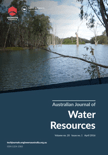
Australasian Journal of Water Resources
Elevating the Discourse on Water SustainabilityThe Australasian Journal of Water Resources, published by Taylor & Francis AS, stands as a pivotal resource in the field of water science and technology. With an ISSN of 1324-1583 and E-ISSN 2204-227X, this esteemed journal facilitates the dissemination of high-quality research articles that address critical issues facing water resources management across Australasia and beyond. Ranking in the Q2 category for Water Science and Technology as per the 2023 metrics, it boasts an impressive Scopus ranking of 75/261 in Environmental Science, placing it in the 71st percentile for its field. Spanning from 2008 to 2024, the journal emphasizes the importance of sustainable water practices, innovative technologies, and environmental policy, making it an invaluable asset for researchers, professionals, and students seeking to advance their knowledge and contribute to the discourse on water management challenges. The journal's rigorous peer-review process and commitment to open academic dialogue ensure that emerging trends and pioneering ideas receive the attention they deserve.
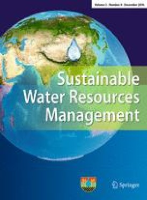
Sustainable Water Resources Management
Pioneering research for a water-secure future.Sustainable Water Resources Management is an esteemed journal focusing on the critical field of water resource management in the context of sustainability. Published by Springer International Publishing AG, this journal serves as a vital platform for researchers, policymakers, and practitioners to disseminate cutting-edge research and innovative practices aimed at addressing global water challenges. With an impressive impact factor aligned with its Q2 ranking in Water Science and Technology and Q3 in Renewable Energy, Sustainability, and the Environment, it maintains a robust reputation in its field, evidenced by its Scopus rankings. Covering a diverse range of topics from integrated water resource management to the nexus between water and energy, Sustainable Water Resources Management is committed to fostering knowledge exchange and encouraging interdisciplinary dialogue among its audience. This journal, operating under strict academic rigor, plays an essential role in advancing sustainable practices and is open from 2015 to 2024, making it a relevant resource in today’s rapidly evolving environmental context.
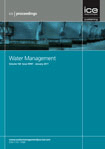
PROCEEDINGS OF THE INSTITUTION OF CIVIL ENGINEERS-WATER MANAGEMENT
Connecting Research and Practice in Water ManagementPROCEEDINGS OF THE INSTITUTION OF CIVIL ENGINEERS-WATER MANAGEMENT is a prestigious journal published by Emerald Group Publishing Ltd, dedicated to advancing the field of water management within civil engineering. With an ISSN of 1741-7589 and an E-ISSN of 1751-7729, this journal delivers peer-reviewed research that spans the critical intersections of water science and technology, contributing valuable insights into sustainable water management practices. As evidenced by its ranking in the 2023 Scopus categories, where it holds the Q3 quartile in Water Science and Technology, and a respectable position among its peers, the journal remains a vital resource for researchers, professionals, and students in the field. Though it is not an open-access journal, it offers accessible subscription options that facilitate worldwide dissemination of knowledge, enhancing its role as a fundamental reference point for cutting-edge developments in water management. For those looking to publish or stay updated on the latest research trends, this journal serves as an essential platform for promoting innovation and sustainable practices in civil engineering and water resources management.

Journal of Water Management Modeling
Shaping Policies for Sustainable Water SolutionsThe Journal of Water Management Modeling, published by COMPUTATIONAL HYDRAULICS INT, stands as a pivotal resource in the fields of Civil and Structural Engineering, Geography, Planning and Development, and Water Science and Technology. With an ISSN of 2292-6062, this Canadian-based journal has earned its reputation by exploring innovative modeling approaches to enhance water management, crucial in addressing today's environmental challenges. Despite its current Q3 status in Civil and Structural Engineering and Water Science categories, alongside a respectable Q2 rank in Geography, the journal is committed to advancing knowledge and fostering collaboration among researchers, practitioners, and students passionate about the sustainable management of water resources. The journal operates on an open-access model, ensuring research is readily available to a broad audience, and has converged its editorial focus from 2018 to 2024, continuously adapting to emerging trends and technologies within the discipline. As a part of the global conversation regarding effective water management, it plays a vital role in informing policies and practices that impact communities and ecosystems alike.
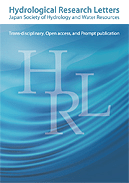
Hydrological Research Letters
Advancing Hydrology: Your Gateway to Innovative ResearchHydrological Research Letters (ISSN: 1882-3416) is a distinguished peer-reviewed journal published by JSHWR, JAGH, JAHS, JSPH in Japan. Established with open access since 2007, this journal serves as a critical platform for the dissemination of innovative research in the field of hydrology, water science, and technology. With an increasing impact factor, currently positioned in the Q3 quartile for both Earth and Planetary Sciences and Water Science and Technology, it attracts a diverse readership keen to stay abreast of groundbreaking findings that shape water management and environmental policy. Researchers, professionals, and students alike will find this publication an invaluable resource for enhancing their understanding of hydrological processes and their implications. The journal is committed to fostering open academic dialogue and encouraging high-quality contributions during its converging years from 2015 to 2024. For more information, authors and readers can access the journal at its address, C/O INT ACAD PRINTING CO, LTD, Shinjuku-ku, Tokyo, Japan.